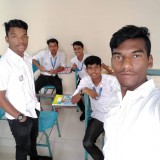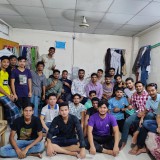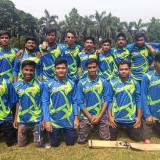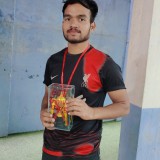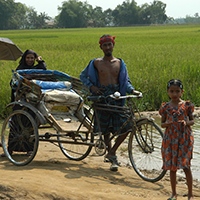Julius: Time Management of a Future Entrepreneur

Twenty-two-year-old Julius Murmu has ambitious plans. He aspires to become a product manager and owner of a textile factory. In Bangladesh, he wants to establish a textile mill, aiming to uplift people from his region to a higher standard of living. Coming from a family of four siblings and modest means, Julius is currently in his second year of vocational school, studying textiles. But how did it all begin?
Life to the Sound of the Bell, but Also Without It
He was six when his uncle persuaded his parents to send the boy to school. And so it happened. His new home became the boarding school SAMS, where he spent 12 years, more than half of his life. He fondly remembers the school, having many friends, a beautiful environment, and a regular routine. Perhaps, a bit too regular.
Looking back, he says, "My life had a regular order dictated by the ringing of the bell. The bell rang, and it was time to get up. The bell rang, and it was time to eat. The bell rang, and it was time to go to school, study, play, work, sleep. I knew exactly what to do when."
 Transitioning to higher education was challenging and somewhat amusing from the perspective of a Central European. It could be expressed as "the bell stopped ringing, and the regular daily routine was over." Yes, it was a significant change. Julius suddenly had a problem with time management, no longer guided by the school bell. There was no signal telling him when to get out of bed, when to eat, when to go to school, when to study. So, he was late everywhere. It took him a while to develop a new habit and start living organized even without the bell.
Transitioning to higher education was challenging and somewhat amusing from the perspective of a Central European. It could be expressed as "the bell stopped ringing, and the regular daily routine was over." Yes, it was a significant change. Julius suddenly had a problem with time management, no longer guided by the school bell. There was no signal telling him when to get out of bed, when to eat, when to go to school, when to study. So, he was late everywhere. It took him a while to develop a new habit and start living organized even without the bell.
Education and Bold Plans
He usually spends 4-5 hours a day studying at school, with an additional 2-3 hours for homework. In his free time, he dances or plays football. The study costs are 15,000 taka (125 EUR) per semester, plus 5,700 taka (47,22 EUR) for accommodation, meals, and everything else. Family, BanglaKids donors, and the BanglaHope organization help cover the expenses. Julius is currently in the second year of a four-year vocational school program and would like to continue with a two-year bachelor's program.
 In Bangladesh, over 4 million people work in the textile industry, but there is an acute shortage of qualified product managers capable of breaking down the entire production process into individual operations and, pardon the expression, assembling a "human production line." This is where Julius sees his opportunity. Good communication skills, structured thinking, and now good time management are skills he will need as a textile workshop manager.
In Bangladesh, over 4 million people work in the textile industry, but there is an acute shortage of qualified product managers capable of breaking down the entire production process into individual operations and, pardon the expression, assembling a "human production line." This is where Julius sees his opportunity. Good communication skills, structured thinking, and now good time management are skills he will need as a textile workshop manager.
But Julius's plans don't end here. He would like to start his own textile factory in the Dinajpur area in northwest Bangladesh with two friends, where he grew up, as textile production is mainly concentrated around the capital city of Dhaka. If successful, many people in the Dinajpur area would gain employment. Weavers and laborers would become textile workers with higher incomes and better living standards. That is his main motivation.
Broader Context of Children's Education in the BanglaKids Program
We wish Julius a lot of patience in his studies, acquiring the necessary knowledge and skills. May he not lose the enthusiasm and motivation that propels him forward toward his dreams of improving the quality of life for people in Bangladesh. This dimension, too, can be part of the support from donors in the BanglaKids program.
Currently, they help specific girls or boys, but in a few years, their financial support can transform into assistance for the entire community, which—thanks to educated Julius—will find better-paid jobs, and the living conditions of many families will improve.
